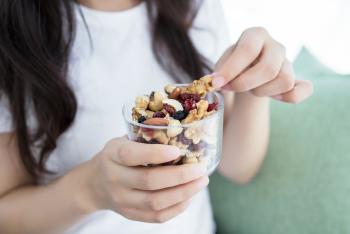Learn about the carnivore diet—a restrictive eating plan that involves consuming only animal-based...
Read More
For many, Starbucks has become a staple of modern life. While their lattes, teas and blended drinks may be a part of your daily routine, many customers don’t realize the amount of hidden sugar in their favorite Starbucks order.
“This is a problem because the majority of Americans consume too much sugar a day, and 35 percent of that sugar intake comes from sugary drinks, coffee and tea,” said Samantha Koonce, R.D., registered dietitian at Inspira Health. “Starbucks is known for making tasty drinks, but that also means they’re using a lot of added sugars and processed ingredients to make them taste that way.”
Here are some tips for a healthier Starbucks experience.
Frappuccinos are among Starbucks' most indulgent offerings, but they come with a hefty dose of sugar. A typical grande (16-ounce) caramel Frappuccino contains a staggering 60 grams of sugar, equivalent to 15 teaspoons. “This is well above the daily recommended sugar intake of around 25 grams for women and 38 grams for men,” said Koonce.
Some specialty Frappuccinos are made with more ingredients than you may know. A mocha cookie crumble Frappuccino, for instance, is made with whole milk, coffee, chocolate chips, mocha sauce, mocha syrup drizzle, a cookie topping and whipped cream—which means the sugar adds up even faster.
To cut down on sugar, opt for simpler flavors or smaller sizes, consider using skim milk or a non-dairy milk alternative or request fewer pumps of syrup.
Even smaller-sized Starbucks drinks can incorporate a surprising amount of sweetener. A tall (12-ounce) sweetened latte comes with three pumps of syrup while a grande comes with four. With five grams of sugar in every pump of vanilla syrup, a made-to-order grande vanilla latte contains 35 grams of sugar in total.
Before ordering, ask your barista how many pumps of syrup they'd recommend based on your preferences, and specify if you want your drink unsweetened. For a touch of sweetness, one to two pumps of sweetener in any size should suffice. You can also request sugar-free syrups or use alternative sweeteners like stevia or honey.
Tea lattes, like a chai tea latte or London fog tea latte, are a popular choice, especially in the colder months. But they’re surprising sources of hidden sugars. A chai tea latte, for example, is made from a chai concentrate loaded with sweeteners—and a grande contains about 42 grams of sugar.
To enjoy a lower-sugar option, consider ordering a plain brewed tea or a tea latte with unsweetened milk, adding your preferred sweetener as needed.
Finally, don’t forget about the natural sugar that exists in milk. A 16-ounce serving of 2 percent or whole milk at Starbucks already contains 25 grams of sugar. If you opt for a non-dairy milk alternative, be cautious of sweetened versions like Starbucks' soy milk, sweetened with vanilla and packed with 27 grams of sugar per 16 ounces. For a healthier alternative, consider almond milk, with only 7 grams of sugar and almost half the calories of soy, 2 percent or whole milk.
We know black coffee might not be everyone's cup of tea, but practicing moderation when adding milk or sweetener to your coffee can help you keep your daily sugar intake in check. “Consuming too many sugary drinks is associated with weight gain and obesity, type 2 diabetes, high blood pressure and tooth decay,” said Koonce. “Treating yourself to a sweet beverage every once in a while is fine, but be mindful of your choices and health in the process.”
At Inspira, we understand the challenges of healthy eating. With help from our nutrition team, you can learn to make healthy choices and develop a strategy that fits your lifestyle. To learn more, make an appointment with a dietitian.
Inspira Health is a high reliability organization (HRO), which means safety is the top priority for patients and staff. To make an appointment, call 1-800-INSPIRA.

Learn about the carnivore diet—a restrictive eating plan that involves consuming only animal-based...
Read More
Mindful snacking after bariatric surgery can help maintain steady blood sugar levels and support...
Read More
Football game days are a time for fun and celebration, but they don’t have to derail your health...
Read More
The material set forth in this site in no way seeks to diagnose or treat illness or to serve as a substitute for professional medical care. Please speak with your health care provider if you have a health concern or if you are considering adopting any exercise program or dietary guidelines. For permission to reprint any portion of this website or to be removed from a notification list, please contact us at (856) 537-6772